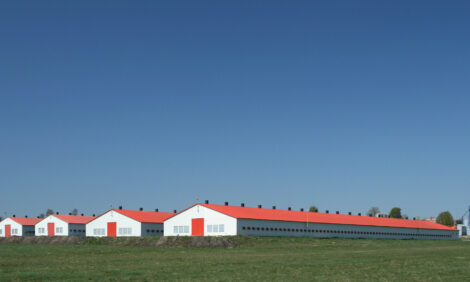



Jamaica Broilers Lights Up Chicken Houses with Solar Plan
JAMAICA - Poultry farmers contracted by the Jamaica Broilers Group have been corralled into a green energy project that the poultry producer says will slice the cost of production through reduced electricity bills.If that happens, it should also mean cheaper chicken for consumers sold under the company's Best Dressed Chicken label, reports The Gleaner.
The project, valued at US$10 million, or the equivalent of J$890 million, will introduce energy-saving devices such as LED lamps, or light-emitting diodes, as a source of light, as well as solar photovoltaic systems, on chicken farms throughout its supply chain.
One of the solar systems was installed less than three weeks ago and has so far generated 1.7 megawatts of power or the equivalent of one barrel, or about 42 gallons (159 litres) of oil. It is also equivalent to the energy from 5,800 cubic feet of natural gas.
"This is about a US$10-million investment to move all our farms on to this model," said Mr Levy. "We figure a two-year roll-out."
Broiler's Best Dressed Chicken division will act as go-between for farmers to the necessary suppliers, providers and financiers of renewable energy, said Christopher Levy, group president and chief executive officer, on Wednesday, speaking from Atkins Farm in Four Paths, Clarendon.
Atkins Farm is the second of two pioneering poultry farms to install a solar-power system under the programme.
Mr Levy said potential financiers include the Development Bank of Jamaica, which has a special facility to allow businesses to access loans to introduce energy efficiency and install renewable-energy solutions; International Finance Corporation, a member of the World Bank group, which backs renewables and energy-efficiency projects; and Corporate Strategies Limited, management and financial business consultants; and the various commercial banks.
Corporate Strategies is owned by Aubyn Hill, who is a director of the Jamaica Broilers board.
Oil fuels about 90 per cent of Jamaica's electricity supplies sold through the national grid.
Jamaica Broilers has long experimented with energy-saving programmes, including co-generation from bio-waste at its St Catherine-based complex. The company diversified into production of fuel-grade ethanol about five years ago, which it sells domestically and in overseas markets.
Mr Levy said that with no decrease expected in the price of oil on the world market over the next four years or more, the Jamaica Broilers Group decided to widen its focus on energy management to facilitate the comprehensive alternate programme, which will supplement the power needs of the majority of tunnel-ventilated chicken houses operated by its contract farmers.
"Preliminary calculations show that the solar systems we have identified are currently financially viable and have the potential to lower the operational costs of each farm within five to six years," Mr Levy said at a farm tour.
Under the programme, the solar equipment is used to collateralise the loans rather than farmers being required to put up their farms for that purpose.
"The amazing thing is that we've been able to work with our financiers. ... The farmer does not have to put up his farm as collateral for this investment. The unit and equipment is the collateral," Mr Levy said.
"That's a fantastic hurdle that we've cleared because it allows us to move fast and it allows us to get that benefit in the short term."
Vice-president for energy at Jamaica Broilers Group, Ian Parsard, speaking with the Financial Gleaner, emphasised that the group is acting as facilitator in obtaining supplies and financing among other things, but that the investment spend will be made by the farmers.
However, given the benefits that are expected to accrue to the farmers in terms of lower production costs, for example, the group hopes to use the programme as leverage in pricing policy to pass some of the savings on to consumers.
Mr Levy said the launch of the cost-containment programme "is a very important step forward", given that "one of the biggest challenges that our farmers face is the constant moving cost of energy."
He said energy, particularly electricity, "is today the single-largest cost on a chicken farm. And the reason for that there is a lot of technology in the house to get efficiencies and that require energy."
The switch to LED lighting in the chicken houses, representing the first phase of the project, has already started and the company is expecting that about 50 of the network of about 100 contract farmers, each operating as minimum of two chicken houses, will take advantage of the project.
Installation of the solar system so far at Atkins Farm and at another farm in Sandy Bay, Clarendon, about two months ago, represents the second phase, Mr Levy said.
He touted both the economic and environmental impact of the programme.
"Every kilowatt of energy that the unit produces is that less oil we have to buy. We need to recognise the national impact this can have."
Operations manager at JB Ethanol and a member of the project team, John Carberry, said research on the programme has been going on for years, but gained momentum last year.
"A few weeks ago, we decided to take a leap and shortlist three suppliers," said Mr Carberry.
This led to their investment in a 10-kilowatt system at the Sandy Bay farm, followed by a 24-kilowatt system at Atkins Farm. A 16-kilowatt system will be installed at an undisclosed location in another few weeks, Mr Carberry said.
He indicated that the 24-kilowatt system was installed and commissioned about 18 days prior to Wednesday, and has so far generated 1.7 megawatts of power.








